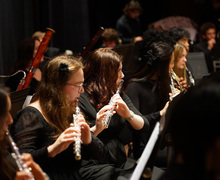Religious department to offer class on relationship between religion, technology
Kiran Ramsey | Digital Design Editor
Syracuse University's religion department is offering a new undergraduate class that will examine the relationship between technology and religion.
Syracuse University’s religion department is offering a new undergraduate class in the spring 2017 semester that studies the relationship between religious practices and digital culture.
REL 320, “Digital Religion,” will be taught by John Borchert, a doctoral student in the religion department in the College of Arts and Sciences. In the class, students will learn to recognize how religious practices are playing a role in digital culture that is shaping everyday life. Students will also be taught about how religion is reformed by the technology, Borchert said in an email.
“We have an incoming group of students who were largely raised within a digital culture, a culture that they helped form,” he said. “This course is a time to pause and be reflective and critical of those practices that shaped them and that they shape.”
Borchert also said students will be exposed to outside of the cultural bubbles that social media creates.
Borcher’s research centers on digital religion. He said he thinks teaching the class is an opportunity for him to see how certain theoretical approaches help students learn while involving them during the search, both its methods and its contents.
The course gathers student-driven perspectives in gathering and deploying materials such as websites and apps for study, Borchert said.
“Central to the course are individual research projects, where students directly engage with digital religious practices in a critical and scholarly way,” he said, adding that the class covers concepts essential to the study of religion: identity, authenticity, authority and ritual in an emerging context.
Philip Arnold, an associate professor and the chair of the religion department, said the class content is not an area that the department historically emphasizes, but it’s becoming more important in the last few years, he added.
The course will question and look at examples of the intersections between religious practices and digital culture, including news articles, websites, apps and games, according to the class syllabus.
“Technology is not only about computers and phones,” Arnold said. “There’s a natural relationship between the development of human society and the technology because human beings have always been fashioning tools that always imply imagination, creativity and inspiration.”
With apps that allow people to visit fully-rendered 3-D temples and churches, people can have different experiences in visit sacred places, Arnold said.
“If people are not able to be there physically, then what does it mean if they can visit there virtually?” he said. “Does it become a substitute in some way or is it something that has a deeper meaning to go there physically?”
Throughout the course, students will encounter questions about the power of digital technologies, the cultures students foster and the role religious practices that is shaping and being shaped by the cultures, Borchert said.
Technology and the practices of making and doing have always been tied up in religious practices, he said.
Brochert said he hopes that the course broadens what people think of religion, in terms of being virtual or digital.
“I hope (that) students learn to ask about religious practices, technology and the interactions between the two while writing and thinking from a more informed and mature position about how religious and digital practices interact and inform each other and how the study of religion and digital culture is changing,” he said.
Published on December 4, 2016 at 11:59 pm
Contact Chieh: chchen@syr.edu





